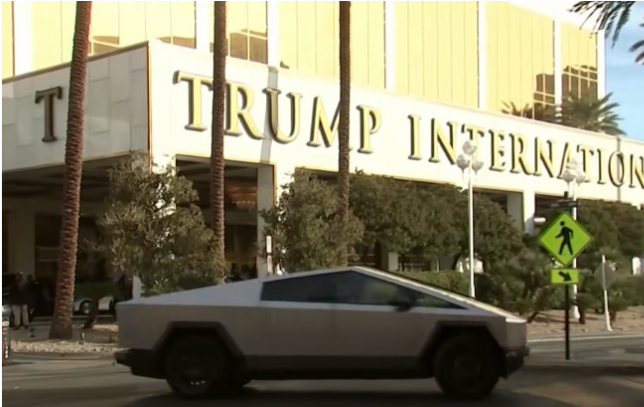Breaking News
Vegas Cybertruck Bomber Identified As Matthew Livelsberger, A Highly Decorated US Army Green Beret

Source: YouTube
The Cybertruck bomber responsible for the January 1 explosion outside the Trump International Hotel in Las Vegas has been identified as Matthew Alan Livelsberger, a highly decorated U.S. Army Green Beret. Contrary to initial speculations involving an undocumented immigrant, Livelsberger’s identity sheds light on a complex profile of a seasoned military veteran.
The Tesla Cybertruck, packed with fireworks and fuel, detonated in the hotel’s valet area, injuring seven people and causing structural damage. Livelsberger, who had reportedly shot himself moments before the explosion, was identified through tattoos matched by his family. Authorities continue to investigate the motive behind this unprecedented act of violence.
Who Was The Cybertruck Bomber?
Cybertruck bomber Matthew Alan Livelsberger was a 37-year-old active-duty U.S. Army Green Beret, serving with the 10th Special Forces Group. Known for his extensive expertise in intelligence and tactical operations, he had a long military career, including deployments to Afghanistan, Ukraine, and Africa. Livelsberger was highly decorated, receiving five Bronze Stars and commendations for valor.
Despite his professional accolades, Livelsberger’s personal life seemed tumultuous. He was reportedly estranged from his wife after she discovered an affair. Days before the explosion, Livelsberger rented the Cybertruck and began a cross-country drive, making stops at Tesla charging stations in several states before arriving in Las Vegas.
Possible Motives of the Cybertruck Bomber
Law enforcement agencies have yet to establish a definitive motive for Livelsberger’s actions. However, his military background, personal struggles, and admiration for President-elect Donald Trump have fueled speculation. Livelsberger, described as a “Rambo-type patriot,” frequently praised Trump’s policies and appeared disillusioned with recent political developments.
Authorities are investigating whether Livelsberger deliberately chose the Cybertruck and Trump Hotel to minimize casualties and send a symbolic message. While no connections to terrorist organizations have been uncovered, the FBI continues to analyze his digital footprint for potential clues.
Parallels to the New Orleans Attack?
The Cybertruck bomber’s Vegas explosion bore eerie similarities to another New Year’s Day attack in New Orleans, where an Army veteran drove a rented pickup truck into a crowd celebrating on Bourbon Street, killing 14 people and injuring dozens more. The suspect, Shamsud-Din Bahar Jabbar, a 42-year-old Army veteran, reportedly acted alone. Before the attack, Jabbar posted videos online declaring allegiance to ISIS and expressing his intent to target civilians.
Meanwhile, the New Orleans attack involved a different truck packed with improvised explosives, which detonated upon impact. Eyewitnesses described a scene of chaos as fireworks exploded and flames engulfed the area. Police engaged Jabbar in a firefight, ultimately killing him. Investigators found a bomb-making station in Jabbar’s home, along with a Quran open to passages referencing martyrdom.
Both Livelsberger and Jabbar had military ties to Fort Liberty (formerly Fort Bragg) and had served in Afghanistan, though there is no evidence they ever crossed paths. While the FBI initially suspected a coordinated effort, it later determined the incidents were independent. Despite their differences, the attacks have raised concerns about the mental health and post-service struggles of military personnel. Authorities continue to investigate whether shared experiences during military service played a role in these acts of violence. Both cases highlight the potential for deep-seated trauma and personal crises to manifest in catastrophic ways.
Subsequent Investigation and Public Response
The FBI and local authorities are meticulously piecing together Livelsberger’s final days. Searches of the Cybertruck bomber’s Colorado Springs home and interviews with colleagues and family aim to shed light on his mental state and potential motives. Cybertruck manufacturer Tesla has cooperated, providing vehicle telemetry and charging station footage.
The incident has sparked debates on military mental health, domestic extremism, and vehicle security. Despite Livelsberger’s history of service, the act raises serious questions about the intersection of personal struggles and public violence.
Is violence in America spiraling out of control? Should we expect more incidents from Americans such as Cybertruck bomber and the New Orleans truck rampager? Tell us what you think about these tragic incidents.

1 Comment
He didn’t kill himself. Check out Shawn Ryan’s interview with Sam Shoemate 1/3/25. Matt knew about the drones and was blowing whistle on event in Afghanistan 2019. He sent an email the day before he was murdered. Probably the ¢¡@.